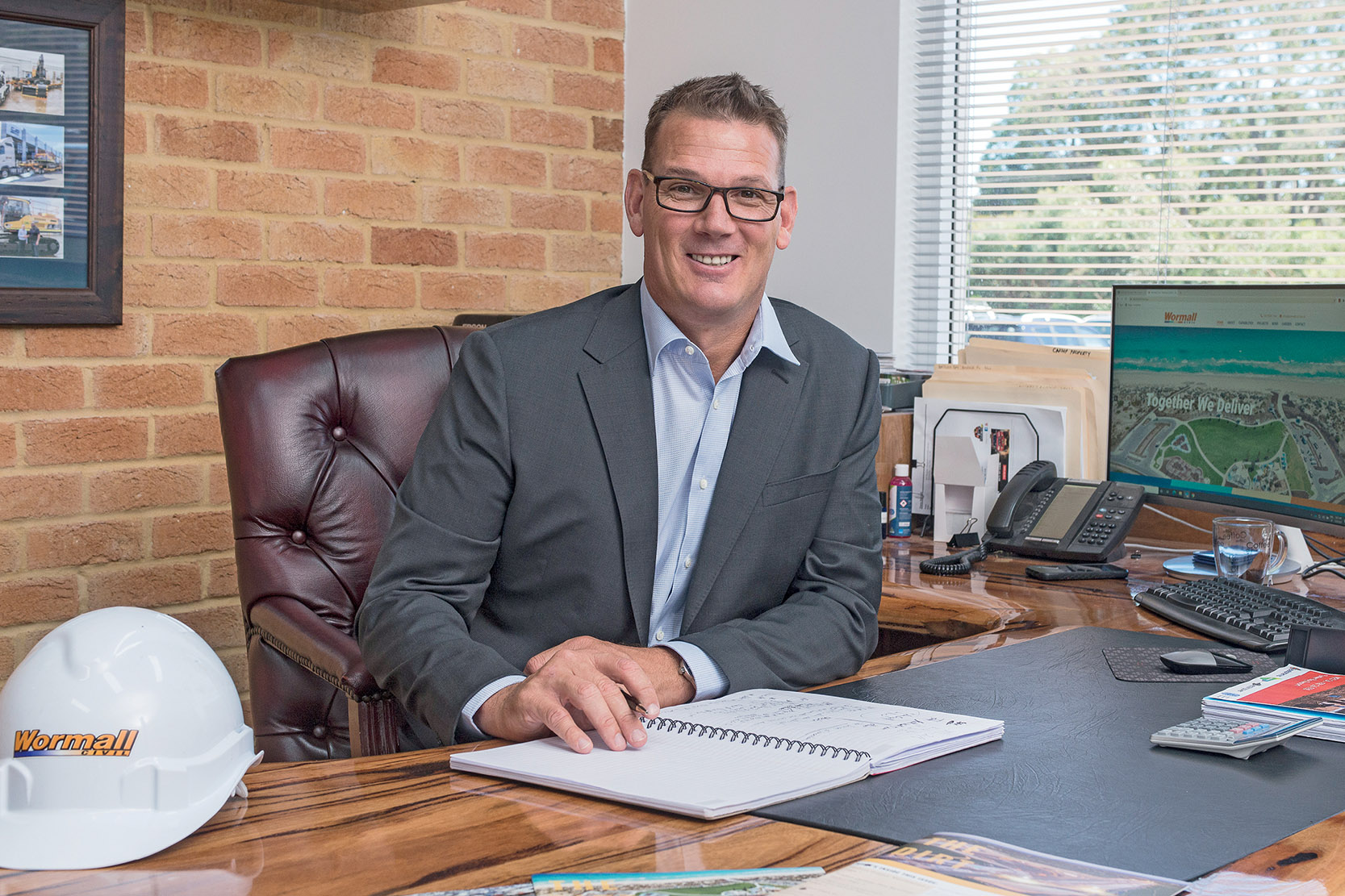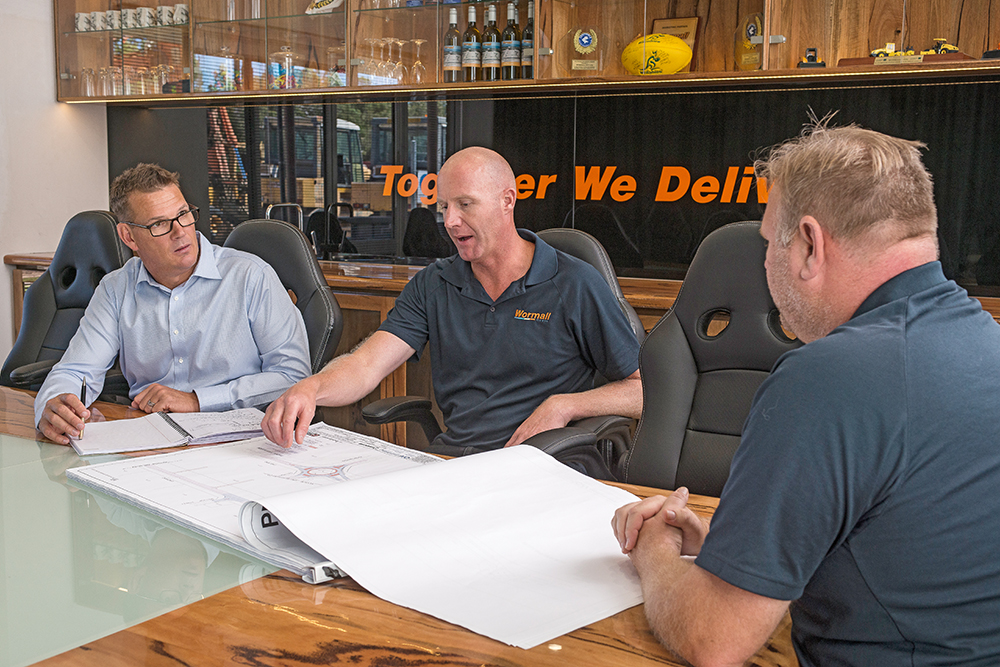I was passionate about following in my father’s footsteps: Shane Wormall
In carrying forward the family legacy of Wormall Civil, Managing Director Shane Wormall hopes to pursue growth strategies and nurture a motivated team amid an uncertain yet recovering industry.
Family-run businesses can be very different to publicly listed companies, purely on that basis. The nature of ownership can shape the culture, the environment and the values, and it’s been noted that family-owned, multigenerational businesses convey stability and security. But the family label can shape the business from the inside as well. Wormall Civil is evidence of this. Managing Director Shane Wormall believes its family-run nature has equipped the business with a flat structure, accessible leadership and an impressive staff retention rate.

Shane’s parents founded the Western Australian business in 1984, so in a sense, Shane was born into it, having a deep connection with the company from a young age. Even before the business was started, he’d go to work with his father, so the connection between his family and the industry has inevitably been there. "I’ve always been hands-on, going to work with dad as a kid and that sort of thing, in the trenches, laying pipes," he recalls. "Most of my early education in this industry has come from that. In the school holidays and on the weekends, I was working in the business with my father."

Always be good to the people that have been good to you, because without them you’re nothing.
Although he didn’t start his career there, Shane joined the family business as a fully fledged employee in 1994 and worked in various roles including on the construction site, supervising, project management and later, estimating. After some time, under his father’s guidance, he started up the manufacturing side of the company. The initial focus of the branch was on vertical integration, manufacturing basic low-tech precast concrete products, and later plastic technology was introduced. Wormall Civil was its biggest customer.
It’s a lesson Shane learned from noted WA businessman Len Buckeridge, Founder of the Buckeridge Group of Companies. "BGC is a big building company, but then Len made his own bricks, windows, cement, quarry products and more. Very much vertical integration," he explains. "There are lots of benefits that came out of that. But there’s always two sides to a coin – the learning that I would take away from what he’s done is to be sure that you don’t build a beast that’s so big that it’s hard to de-layer it at any point."
In 2005, Shane saw bigger opportunities for that manufacturing business, buying it off his parents and going independent to start Smartstream Technology. With his brother still looking after the family business, things continued in that vein for more than a decade, and Shane admits he didn’t think he’d ever have a chance to rejoin Wormall Civil. But in 2017, he got exactly that chance.
It was naturally in my DNA to be in this industry and to run the business.
"In 2016, my brother expressed to me that he was ready to semi-retire, go on to the next venture," he remembers. "So in late 2016, we spoke about it and in early 2017, we struck a deal and 1 July 2017 was the official date that I took over sole ownership of Wormall Civil.
"I didn’t think I was ever going to be given the opportunity to come back into this business. But I did, and with a ton of energy because of the chance to bring the two businesses back together, as they once were intended to be from those very early years, and also to benefit from the synergies and vertical integration."
Perhaps Shane’s passion and shrewdness for growing the business are the result of his lifelong connection to the industry. "I was born into the civil contracting industry," he says. "I often use the comparison that it’s akin to the farming industry, where it’s the farmer to his son.
"From a young age, I was passionate about following in my father’s footsteps. I’ve learned a lot from him over many years and still do. It was naturally in my DNA to be in this industry and to run the business."
But the period outside of the family business proved a valuable learning experience too. In the 12 years that he remained focused on Smartstream Technology, Shane learned one of the most valuable lessons for a contractor: customer service. He says that contractors typically deal with a "closed network of engineers and tendering processes". However, at the start of the Smartstream Technology period, he built up his confidence by holding sales presentations and chasing approvals, ultimately learning to chase sales and satisfy customers.
Today, Wormall Civil operates across land development projects of various sizes in WA. Bringing more in house has been a strong focus and provides benefit to its customers. Meanwhile, the Smartstream Technology arm specialises in manufacturing and supplying specialist products for the civil construction industry, specifically relating to wastewater and stormwater systems. With both businesses continuing to expand, Shane admits that what he loves the most about his work is the chance to pursue growth strategies with effective and coherent planning. Wormall Civil, for one, will chase geographical expansion, while Smartstream Technology will continue to bring more manufacturing capabilities in-house. The intent is to create a more independent business, one that is less vulnerable to market downturns, such as the one many businesses endured through the COVID-19 pandemic.
"The biggest challenge is obviously dealing with the market volatility," Shane says. "So, if we look at last year, we can learn from that and how it may affect us. We started 2020 with a rockbottom industry, which started to pick up a little and then obviously it dropped away massively when COVID-19 hit. And then with the announcement of the government stimulus package, our market was flying again.
"So, if I had to make an educated assumption, we’ll see two to three years of what we’ve got now, providing there’s not too much in the way of crisis that pulls us back. Two to three years of good growth in housing construction and we can continue to build and grow. It certainly won’t be what it was in the last six months of 2020, as far as volume, but certainly a much healthier volume than what we’ve suffered in the years before that."
In the industry downturn preceding 2020, and indeed across all three years that Shane has led the business, Wormall Civil had dedicated itself to internal transformation and reshaping its values where necessary. He says the business is now well-positioned and focused on safety, agility and responsibility to customers, the environment and other compliances issues.
"We’ve focused on HR in a big way with a couple of key people and an enhanced organisation structure," he says. "An Advisory Board has been introduced as the next phase in the governance and leadership of the business.
Some of our competitors, in years when the market has been very lean, have not looked after and respected their staff.
"With the large numbers of people that we have through the business, between supervisors and project managers, rather than expecting that every person has the same attitude or same outlook each day, we’ve actually introduced several layers of operational management throughout the business which did not exist previously. An overhead layer, if you like, but it’s a layer of quality control, communication, feedback and support to our staff, while ensuring reliability and consistency to our customers.
"For example, it has allowed us to actually put supervisors into positions and have someone that’s actually there helping to guide them. It’s almost like on-the-job training, giving them specialist one-on-one training on how to do their job better, teaching them and getting feedback from them."
With 400 full-time employees in Wormall Civil, 50-plus in Smartstream Technology and a number of full-time subcontractors that have been with the company for at least 10 years, there’s a big team of people that contribute towards Shane and the companies’ achievements.
He believes it is critical to communicate the company’s future to the employees and make them feel heard at the same time, rather than feeling separated from the business’s leadership. Such an approach to management will no doubt be an asset in WA’s industry, which Shane says is faced with a dearth of talent, driven by people leaving to take advantage of Victoria’s recent housing boom. However, the projects are now hitting the market and Shane hopes to attract talent through the appropriate incentives, such as free airfares and accommodation for out-of-state workers.
Meanwhile, the company is also training up internal staff and making it easier for women to move into the industry. But a good business isn’t just defined by how well it treats its team in the good times, Shane says.
"Some of our competitors, in years when the market has been very lean, have not looked after and respected their staff," he notes. "They haven’t been treated as part of the family.
"But when the market turned and sprung back to what it is now, those same organisations have been left with no-one because people, all of a sudden, have other opportunities and they walk.
"So the message I would say is always be good to the people that have been good to you, because without them you’re nothing."
Proudly supported by: